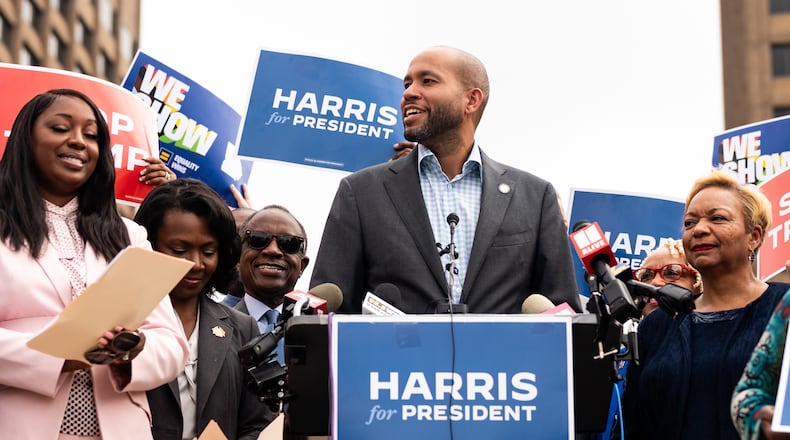“There’s a floating island of garbage in the middle of the ocean. I think it’s called Puerto Rico.”
These words, uttered by a so-called comedian at former President Donald Trump’s New York rally on Sunday at Madison Square Garden, have been on my mind for days. As a Puerto Rican raised in Georgia, it reminded me of the ignorance some have about Puerto Rico and its people — U.S. citizens who contribute to the fabric of America in our military, as small business owners, as faith leaders and even as elected officials like me.
For anyone, much less a speaker on a national political stage, to dismiss an entire community as “garbage” is appalling.
This insult was just one of several dehumanizing remarks that night, as multiple speakers — not just one comedian — hurled racist and xenophobic insults at Black people, Jews, Palestinians and Latinos. Trump himself warned of an America “invaded” before promising a “golden age” under his leadership.
When asked about the event, the former president proclaimed that it was an “absolute lovefest.”
Did you feel the love? I didn’t and still don’t.
These disturbing tropes reflect a campaign strategy that relies on fear and division, not love and respect, to mobilize voters by inciting hostility toward Black and Brown communities and immigrants rather than tackling real issues impacting hardworking Americans. Trump’s rally Sunday followed his history of inflammatory comments, from calling Mexican immigrants “criminals” and “rapists” in 2015 to his debunked claim that Haitian immigrants in Springfield, Ohio, were “eating the dogs … they’re eating the cats.”
Sunday’s rally was another stark reminder of his disturbing normalization of xenophobic rhetoric.
When a senior Trump adviser at the rally declared “America is for Americans and Americans only,” the message was clear: if you are not like us, you are not welcomed here.
But this narrative deliberately ignores what makes America great: the contributions of hundreds of millions of people who reflect different cultures, ethnicities and races pursuing a dream of something better for themselves and their families. This kind of “us vs. them” rhetoric reduces the rich fabric of American society and is an exclusionary, simplistic and dangerous message.
Xenophobic language from political leaders is not just offensive, it also breeds real-world harm.
When politicians label communities as “invaders” or “garbage,” it sends a signal that discrimination is OK and that some people are inherently lesser than others. The hateful comments from Trump and his allies put their politics of division on full display as if to say only certain people deserve the rights and privileges of American citizenship.
This language pushes the narrative that immigrants or certain communities are to blame for broader societal problems.
Not only is it untrue, but it’s also a distraction from real efforts to improve the lives of our neighbors by bringing down health care costs, improving our public schools and building an economy that works for hardworking families. Instead of focusing on solutions, divisive language is weaponized to create an “enemy” where none exists. We all want to make the country a better place for our children and our families.
I believe that is something that voters across the political spectrum agree on: We have grown tired of the politics of fear and division.
Maybe this will be the proverbial straw that breaks the camel’s back, and we will return to a place where our politics focus on policy and real solutions, not on attacking and belittling those we see as different.
This election (which will be over in just a few days!) gives us the opportunity to make clear that no person or community is less than any other and that the only pathway to a stronger America is by working together. Let’s use this moment to send a clear message that we choose unity, respect and real solutions over fear and division.
Jason Esteves, a Democrat, represents Atlanta in the Georgia state Senate.
About the Author



